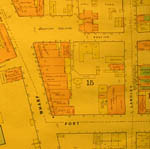 |
 |
 |
 |
 |
 |
 |
“Foreigners are less protected by the law; minorities, or those who are different, are already suspect. They make excellent hooks on which to hang collective anxiety… Whatever the case, the collective conscience does not recoil from choosing an innocent person to pay for the crimes others...To attribute our own failures to the misfortune of another person makes the situation more tolerable.” Historically, the racialization of the Native population, as well as that of other minorities of the Colony of Vancouver Island, was fueled by public opinion, local newspapers, and a newly fashioned ‘British influenced’ legal system. Used as a medium for both the transference of misguided opinion and racial generalization, these public and governmental systems created and perpetuated the existing tensions experienced by different ethnic groups in early Victoria. The trials and concluding explanation regarding the murder of Constable Johnston Cochrane illustrate the racial tension that existed during this period in addition to demonstrating the weak and decidedly biased nature of a developing legal system. Sadly, we may never know who killed Johnston Cochrane. The lack of existing documentation of the crime and subsequent trials, and the failure to provide such documentation in the initial investigation, leaves only the attribution of blame on the “local native population of the Victoria area”. A nameless, faceless murderer amongst the meticulous elite of Colonial
Victoria. Surely it is easier to ascribe the blame of a crime, that
is of such a horrifying nature, to a population of “savages”
not afforded the rights or voice bestowed upon their fair-skinned
counterparts. Today, all that remains of this incident are sparsely
recorded “facts” and a partial understanding of a crime,
not forgotten, but buried in the shame of our past.
|